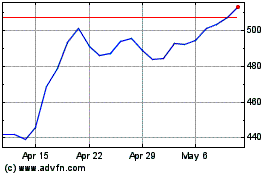By Richard Rubin
EDEN PRAIRIE, Minn. -- Rep. Erik Paulsen followed the classic
congressional playbook: Score a plum committee spot, rack up
bipartisan accomplishments, raise millions in campaign cash and
help write a major tax law delivering tangible gains back home.
That may not be enough.
Seeking a sixth term in the Twin Cities' western suburbs, Mr.
Paulsen faces a pair of problems. The tax law isn't popular among
Americans -- and neither is the president who signed it.
Mr. Paulsen is the most endangered Republican member of the
tax-writing Ways and Means Committee. His district, which includes
the Mall of America and the headquarters of UnitedHealth Group
Inc., hasn't elected a House Democrat in 60 years. But Hillary
Clinton won here in 2016, putting Mr. Paulsen on Democrats' target
list despite his 14-point victory two years ago. The race now leans
Democratic, according to the Cook Political Report.
Democrats need a net gain of 23 seats to regain control of the
House. Republicans had hoped passage of a major tax cut last year
would insulate them from losses, but it has proved a tough sell on
the campaign trail, and some GOP candidates are emphasizing other
issues.
Mr. Paulsen isn't running from the tax law. He's a fervent
advocate, trumpeting the strong local economy to business owners
and workers and arguing that the law's effect on the economy has
exceeded expectations. His ads hammer challenger Dean Phillips,
suggesting the Democrat's opposition to the law means he objects to
the middle-class tax cuts it contained. About 37% of TV spots
favoring Mr. Paulsen mention taxes, more than the 30% average for
Republicans, according to Kantar Media/CMAG, which tracks political
advertising. Fewer GOP ads mention jobs and the economy more
broadly, even as a Wall Street Journal/NBC News poll last month
showed 69% of voters were satisfied with the state of the
economy.
"If you went back five or six years ago, people would be
concerned about, 'Is my neighbor going to lose their job?' " Mr.
Paulsen, 53 years old, said. "That's no longer a concern."
The law's impact varies by individual, and it can be hard to
explain. Even people who benefit may not have their votes swayed by
a few hundred or a few thousand dollars.
Mr. Phillips is running, in part, on opposition to the law. The
first-time candidate managed his family's distilling company and
co-founded gelato maker Talenti before launching a quirky campaign
featuring a "Government Repair Truck" and a "Conversation Cottage"
headquarters.
The Democrat says he would have voted against the law and
instead sought a gradual corporate-tax rate cut and a plan tilted
more toward middle-income families. "Many have been clinging to the
Republican platform because of fiscal responsibility and consider
this bill fiscally irresponsible," Mr. Phillips said in his pitch
to the district's centrist Republicans. "Using this national credit
card, that's easy politics."
The candidates spent a public-radio debate last week calling
each other hypocrites and liars, interrupted by a "Minnesota nice"
interlude where each said "goodness gracious" to the other.
Three other Ways and Means members -- Peter Roskam of Illinois,
Mike Bishop of Michigan and Carlos Curbelo of Florida -- are in
tossup races as they try to sell their biggest achievement.
"People almost universally hate it," said Sean Casten, the
Democrat challenging Mr. Roskam in Chicago's western suburbs.
"Nobody is buying the argument that this was good for the middle
class." Mr. Roskam's campaign points to tax cuts flowing to the
district and investments by local manufacturers.
For Mr. Paulsen, the lakefront towns and office parks west of
Minneapolis are a place where the tax cut could work politically.
The district has the state's highest median household income, at
more than $89,000. The thriving region is packed with workers for
major corporations helped by the law, and the district's
unemployment rate is well below the national average.
For individuals, paycheck withholding decreased in February, but
people can't yet compare 2017 and 2018 returns. Unlike the 2001 tax
law, Republicans didn't front-load a visible rebate check. National
polls show the law hovering around 40% approval.
"It seems to have snuck up on the Republican Party that this was
not the winner that they thought," said Vanessa Williamson, a
Brookings Institution fellow.
Bill Hull of Plymouth, who works part-time in security, said he
cast his absentee ballot against Mr. Paulsen. "It's kind of like
immediate gratification," he said. "In the long run, we shouldn't
pass a tax cut if we can't pay for it."
At their debate, Messrs. Phillips and Paulsen sparred over who
benefits.
Mr. Paulsen said high-income households now pay a greater share
of federal taxes.
"While rates got cut for everybody, this was definitely geared
to lower- and middle-income folks, by far," Mr. Paulsen said.
Mr. Phillips said about 80% of the tax cuts go to the top 1% of
households.
Both data claims are accurate but misleading, which helps
explain why voters may also be confused.
Mr. Paulsen is correct that richer filers now pay a greater
share of a smaller pie of federal taxes, but high-income households
got larger tax cuts in dollars and as a share of income compared
with the middle class. Mr. Phillips's numbers are from 2027, after
individual tax cuts are slated to expire; Republicans want to
extend those.
Christopher Gibbons of Plymouth, a grocery-store manager, said
he voted for Mr. Paulsen in some earlier elections but opposes him
now. The tax law, he said, is "geared more toward the upper
tier."
The corporate-tax cut, meanwhile, was designed for long-run
growth. That means the promised virtuous cycle of investment,
productivity gains and wage increases doesn't align with the
election cycle.
Last week, Mr. Paulsen toured Diversified Plastics Inc. in
Brooklyn Park, which makes customized pieces for medical devices
and filters. Because of its employee-owned structure, the company
didn't get a direct tax cut, said Chief Financial Officer Roger
Vang.
The company has seen sales rise with its customers' fortunes and
from Mr. Paulsen's work building bipartisan opposition to a tax on
medical devices. Employee-owners' shares -- their retirement funds
-- jumped as much as 10% because tax cuts made the company more
attractive to potential buyers, Mr. Vang said. The company recently
raised its starting wage to $15 an hour.
"He's been pushing all of our buttons," Mr. Vang said of Mr.
Paulsen.
Write to Richard Rubin at richard.rubin@wsj.com
(END) Dow Jones Newswires
October 08, 2018 05:44 ET (09:44 GMT)
Copyright (c) 2018 Dow Jones & Company, Inc.
UnitedHealth (NYSE:UNH)
Historical Stock Chart
From Mar 2024 to Apr 2024

UnitedHealth (NYSE:UNH)
Historical Stock Chart
From Apr 2023 to Apr 2024
